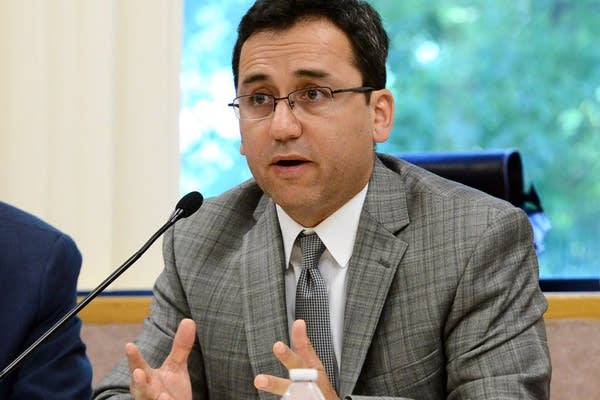Mpls. superintendent pick Paez knew of Mass. school abuse allegations

Go Deeper.
Create an account or log in to save stories.
Like this?
Thanks for liking this story! We have added it to a list of your favorite stories.
Officials with Minneapolis Public Schools say contract negotiations with incoming Superintendent Sergio Paez are still underway, despite allegations of severe child abuse at a school that was in the district he supervised in Massachusetts.
A report out this week from a disability advocacy group in Boston says special needs students were illegally restrained, thrown into walls and onto floors. Paez says he was not asked about the allegations during his Minneapolis job interviews.
On a 6-3 vote Monday night, the school board picked Paez as the district's new superintendent. Just before the roll call, Ted Blaesing — a consultant the district hired to help with the search — assured board members that Paez and the other two finalists were thoroughly vetted.
But board members did not learn about the allegations of physical abuse in the Therapeutic Intervention Program at the William R. Peck school for fourth through eighth grade until several days after they voted.
Turn Up Your Support
MPR News helps you turn down the noise and build shared understanding. Turn up your support for this public resource and keep trusted journalism accessible to all.
Blaesing couldn't be reached for comment.
Paez was Holyoke superintendent for two years. The Massachusetts district has 11 schools, including Peck. He stepped down in July amid a state takeover of the district. The Massachusetts Department of Elementary and Secondary Education declared it "chronically underperforming" in a report last February, citing consistently poor standardized test scores and low graduation rates.
The report from the Disability Law Center, an advocacy group in Boston, revealed serious problems at Peck.
It said special needs students were tackled to the ground, and bruised and scratched when staff members grabbed them.
Investigators with the nonprofit group based their report on interviews with staff, students and parents, as well as school records.
Liza Hirsch, who worked at the school, said her former colleagues excessively used prone restraints, where children are immobilized face down.
"Students who were being defiant, or not listening, or maybe have run out of the classroom or being disrespectful toward staff, they would be met with physical restraint, which is unlawful," she said.
Under Massachusetts law, restraining students is only allowed when non-physical interventions would be ineffective and the student's behavior poses a serious threat.
Hirsch worked at the Peck school for six months beginning in August of last year, where she oversaw community partnerships and was a liaison to families. One day a boy told her a staff member locked him in a closet.
"He was very shaken up, very emotional, speaking only Spanish. And he expressed that he is afraid of the dark so it was really terrifying for him and that he's had nightmares ever since," she said.
Hirsch said what makes these incidents potentially even more damaging is that many students at Peck already suffer from emotional disabilities including post-traumatic stress disorder.
Hirsch documented what she saw and told her superiors. When nothing changed, Hirsch said she resigned in March and sent a letter detailing her allegations to Paez.
"I did receive a response from him and the response said that safety is of paramount concern to him and that he would investigate all of the issues that I had raised," Hirsch said.

Paez said his staff conducted a thorough investigation and did not find evidence of abuse. He said staff at Peck received training on how to handle disruptive students.
"We provided professional development for the staff, we reviewed the policies and procedures, and we made sure that everybody was following the protocols," he said. "So we were very careful about doing that."
In its report, the Disability Law Center said the Massachusetts Education Department investigated a complaint about the seclusion and restraint of students at Peck, and found it noncompliant.
Paez said he considers the case closed, but also said the allegations in the report should be examined further.
"I'm looking forward to seeing what the claims are and how we can follow through to understand whether or not there's new evidence that we haven't assessed, that we haven't evaluated," he said.
During extensive rounds of job interviews in Minneapolis, Paez said no one asked him about the problems at Peck.
A statement from Minneapolis Public Schools General Counsel Amy Moore said the board takes the allegations seriously and is in contact with Massachusetts education officials about their investigations. The statement said contract negotiations with Paez are proceeding.


